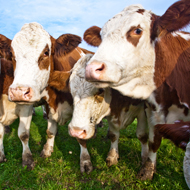
Discovery could lead to rapid diagnostics and targeted therapy
Scientists have identified potential biomarkers of mastitis in milk, paving the way for real-time diagnostics and targeted therapeutics.
Using new technologies, researchers from the University of Glasgow and the Moredun Research Institute analysed 570 proteins and 690 metabolites for the first time in the same milk samples.
Among these, they found possible biomarkers of mastitis which could become the basis of rapid diagnostic tests. This would give farmers real-time information on the health status of their animals, allowing for targeted therapy, they say.
David Eckersall, professor of Veterinary Biochemistry at the University of Glasgow, explains: "Our results in identification and monitoring of biomarkers of the disease have opened new possibilities in the diagnosis of this economically important disease, while changes observed in the chemical components of milk has stimulated ideas on the potential role of natural agents on disease processes.
"The combination these avenues of research may lead in the future to better diagnosis and treatment of mastitis and could reduce the amount of antibacterial agents currently being used in treatments.”
Mastitis is estimated to cost the global dairy industry €16-26 billion a year. Not only does the disease cause significant health and welfare problems for infected cows, but the use of drugs to treat cows is thought to be a significant factor in the rise of antimicrobial resistance.
"Better tools for early and specific detection of mastitis are urgently needed to support on-farm decision making on mastitis management and treatment," said Professor Ruth Zadoks from the Moredun Research Institute.
"Results from the work will help to enhance animal welfare, food security, and the judicious use of antimicrobials."



 The latest
The latest